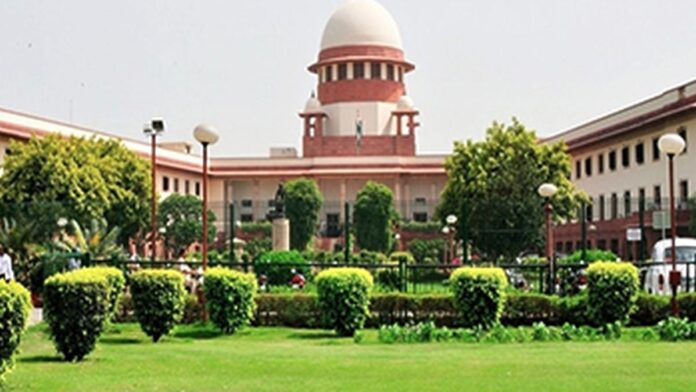Calling it violative of right to information and freedom of speech under Constitution
Apex Court directs bank to stop issuance of anonymous poll Bonds, orders SBI to to provide the details of donations and the information about the parties that received these contributions to the ECI
The scheme allows individuals — who are citizens of India — and domestic companies to donate these bonds — issued in multiples of Rs 1,000, Rs 10,000, Rs 1 lakh, Rs 10 lakh, and Rs 1 crore — to political parties of their choice
Manoj Kumar Pathak
New Delhi : In a landmark judgement, the Supreme Court on Thursday annulled the electoral bonds scheme for anonymous political funding, saying it violates the constitutional right to freedom of speech and expression as well as the right to information. The Apex Court pronounced its verdict on a batch of petitions challenging the validity of the Electoral Bond scheme, which allows for anonymous funding to political parties. A five-judge Constitution bench headed by Chief Justice D Y Chandrachud delivered two separate but unanimous verdicts on pleas challenging the scheme.
Supreme Court holds that anonymous Electoral Bonds scheme is violative of Right to Information under Article 19(1)(a). SC says infringement to the Right to Information is not justified for the purpose of curbing black money. In its ruling, the court emphasized the significance of political parties in the electoral process, highlighting that transparency regarding their funding is crucial for informed electoral decisions.
The court concluded that undisclosed contributions to political parties violate the right to information and Article 19(1)(a) of the constitution.
It was noted that donations to political entities in exchange for favorable policies can result in a quid pro quo arrangement. Furthermore, the court clarified that the right to privacy regarding political affiliation does not extend to contributions aimed at influencing public policy, applying solely to contributions below a certain threshold. The amendments to the Income Tax Act provision and Section 29C of the Representation of Peoples Act were deemed ultra vires by the court.
The Constitution Bench of Supreme Court, led by Chief Justice of India, DY Chandrachud, and comprising Justices Sanjiv Khanna, BR Gavai, JB Pardiwala, and Manoj Misra, delivered the verdict. The Association for Democratic Reforms, the Communist Party of India (Marxist), Dr. Jaya Thakur, and Spandan Biswal had challenged the Electoral Bond Scheme in the Court. The Court ordered ECI to publish donation details by March 13.
The Court has instructed the banks issuing electoral bonds to cease the process. The State Bank of India (SBI), which was authorized by the Centre to sell the bonds, has been directed by the top court to provide the details of donations made through electoral bonds and the information about the political parties that received these contributions to the Election Commission of India (ECI). SBI shall submit these details to the ECI. The ECI shall then publish this information on its website by March 13, 2014.
Key Highlights of the Judgment
SC strikes down electoral bonds scheme: The top court struck down the electoral bonds scheme calling it unconstitutional.
–
Not the only means to curb black money in electoral financing: The Supreme Court said infringement to the Right to Information is not justified for the purpose of curbing black money. “There are other alternatives which substantially fulfil the purpose and impact the right to information minimally when compared to the impact of electoral bonds on the right to information,” SC said.
–
Electoral bond scheme violative of freedom of speech and expression: Pronouncing the verdict, the CJI said the scheme is violative of freedom of speech and expression under Article 19(1)(a) of Constitution. The bench said the fundamental right to privacy includes citizens’ right to political privacy and affiliation.
Advantage for party in power: The Constitution bench held that the Electoral Bonds scheme will help the party in power to gain an advantage. “There is also a legitimate possibility that financial contributions to a political party would lead to a quid pro quo arrangement because of the close nexus between money and politics, SC said.
SBI ordered to stop issuing Electoral bonds immediately: SC ordered the State Bank of India (SBI) to stop issuing Electoral Bonds immediately. The top court asked the SBI to furnish details of the political parties that received Electoral Bonds since April 12, 2019, and all the particulars received and submit them to the Election Commission of India by March 6. The details that the SBI will furnish will disclose details of each electoral bond encashed by the political parties, which shall include the date of encashment and the denomination of the electoral bond. The apex court said that by March 13, the ECI shall publish the details of Electoral Bonds on its official website.
What is Electoral Bond Scheme:
An electoral bond is a financial instrument introduced in India in 2018 for donating money to political parties. It’s purchased from specified State Bank of India (SBI) branches, providing anonymity to donors. Critics raise concerns about transparency and influence on political parties. The first batch of electoral bonds were sold between March 1-10, 2018 at designated branches of State Bank of India. The scheme allows individuals — who are citizens of India — and domestic companies to donate these bonds — issued in multiples of Rs 1,000, Rs 10,000, Rs 1 lakh, Rs 10 lakh, and Rs 1 crore — to political parties of their choice. Only the political parties registered under Section 29A of the Representation of the People Act, 1951 and which secured not less than 1 per cent of the votes polled in the last elections to the Lok Sabha or a state legislative assembly are eligible to receive electoral bonds.


